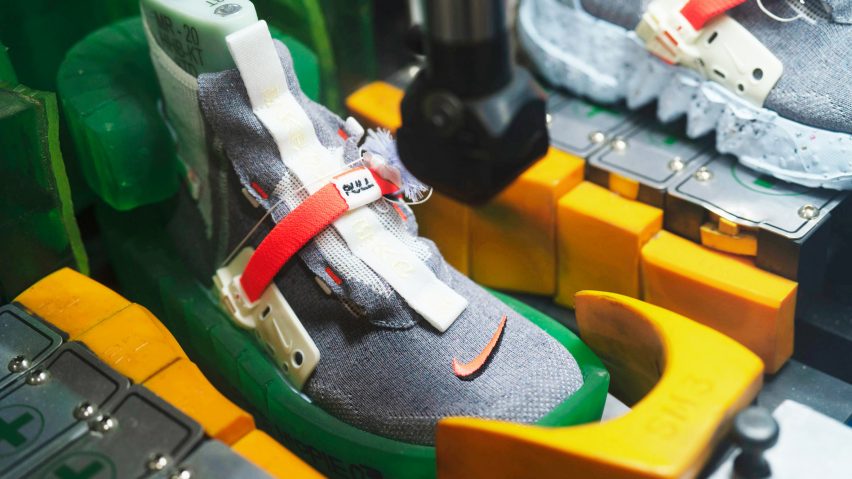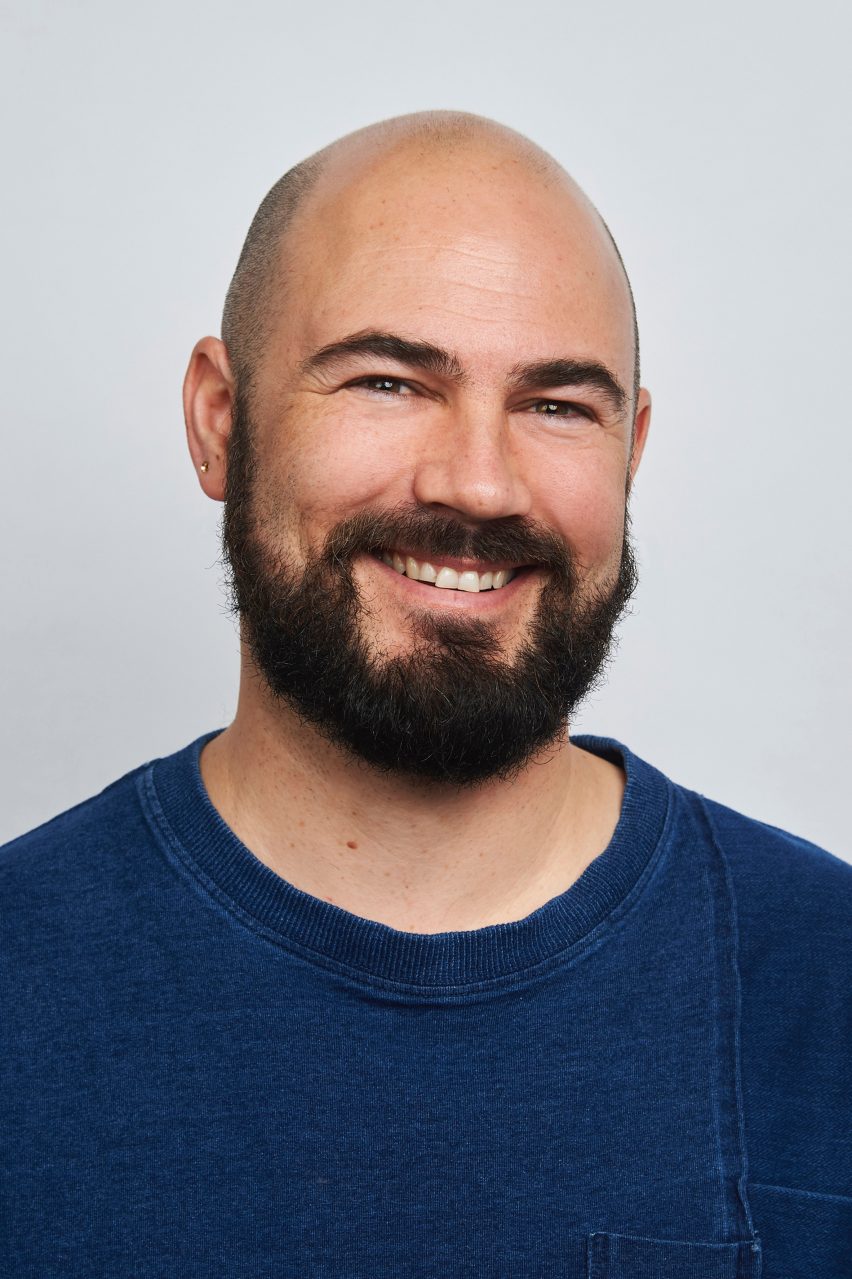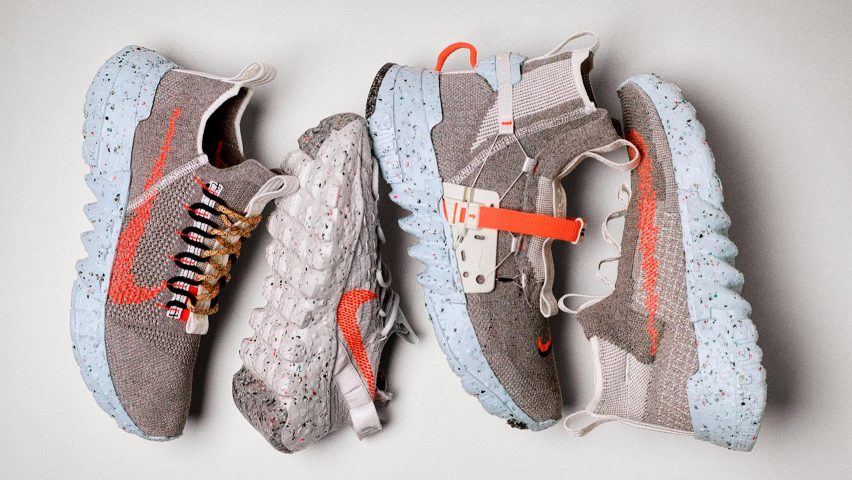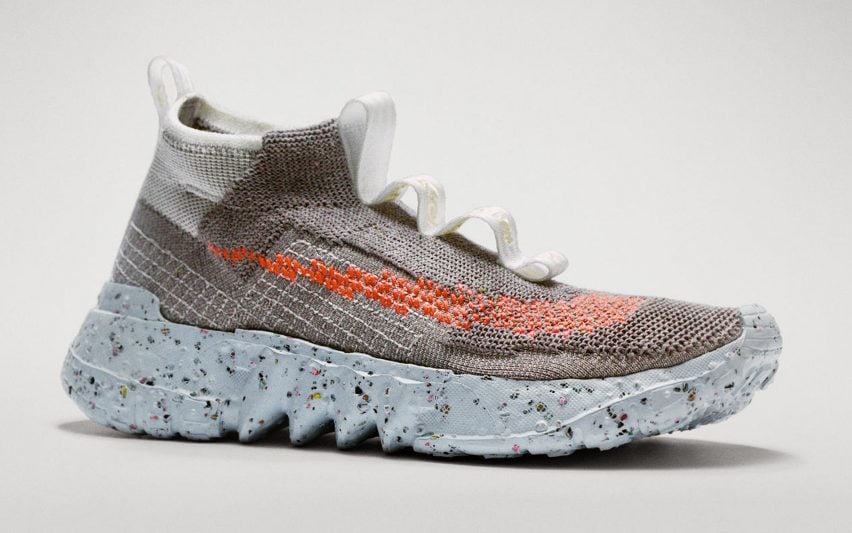
"We are in the midst of two global crises" says Nike's sustainability lead
The coronavirus pandemic will bring an "intense focus" on the world's environmental crisis, says Nike's sustainable design lead Noah Murphy-Reinhertz.
The impact of the current pandemic gives an insight into what may happen if we do not address the current climate crisis, according to Nike's Murphy-Reinhertz.
"Right now we're in the midst of two global crises," he told Dezeen.
"One is super visible that we're experiencing and immediately it's put us all back into isolation for a few months," Murphy-Reinhertz continued. "But the other crisis that's happening at exactly the same time is one that could put us all inside air-conditioned homes and gyms for the foreseeable future."
Speaking ahead of the launch of Nike's Space Hippie trainers, which have the lowest carbon impact of any shoe made by the sportswear brand, Murphy-Reinhertz said that companies need to act now to prevent this future becoming a reality.
"That's not the kind of future that Nike wants for the planet or for sport," he said. "So, acting with urgency and showing a really committed response to that in this moment is super, super imperative."

Murphy-Reinhertz said the pandemic and enforced isolation has already caused people to reconsider how they live. "What's very interesting about the pandemic is how it's making us live differently, right now," he said.
He believes people will also rethink what is important to them in the aftermath, including sustainability.
"It's going to accelerate the adoption of things that have meaning," he explained. "Sustainability is one of those things. But there's a lot of other ones from all the things that Nike stands for in terms of purpose, like a thriving planet, sport as a positive influence."

The Space Hippie is knitted from what Nike calls "space waste yarn", which is made from recycled plastic water bottles, T-shirts and textile scraps. In total 90 per cent of the upper is made from recycled content.
The trainers, which have around 3.7 kilograms of carbon per pair, are designed to "celebrate the potential" of a more sustainable product, but also to be fun, Murphy-Reinhert explained.

Nike unveiled its Space Hippie in February this year as coronavirus outbreaks spread globally. Murphy-Reinhertz believes that because of this people have become more excited about projects like a sustainable shoe.
"When we took the shoes and the materials around to all the different teams, not just design, but all the different product teams at Nike, the response was super enthusiastic," he said. "People were really excited to take these things and begin to work with them."
"But what the current moment is doing is it's bringing a really intense focus on to that. That's what's really powerful for our design teams and our product teams right now is that sense of focus."

Nike's wider sustainability aim is to reduce all carbon and all waste as part of its Move to Zero commitment. According to Murphy-Reinhert, the Space Hippie trainers give Nike a target that they need to beat in the future.
"That [Move to Zero] almost certainly is fairly far away, because that's a really, really lofty goal," he continued.
"But we have a bit of a roadmap because Space Hippie basically achieves 3.7 kilograms of carbon per pair. Okay, that's what we know, we still have to solve for, and we have to solve a lot more. But that's a very concrete goal."
Read on for the edited transcript of the interview with Murphy-Reinhertz:
Tom Ravenscroft: Why is Nike releasing the Space Hippie now?
Noah Murphy-Reinhertz: Right now we're in the midst of two global crises. One is super visible that we're experiencing and immediately it's put us all back into isolation for a few months. But the other crisis that's happening at exactly the same time is one that could put us all inside air-conditioned homes and gyms for the foreseeable future.
That's not the kind of future that Nike wants for the planet or for sport. So, acting with urgency and showing a really committed response to that in this moment, is super, super imperative.
Back in somewhere around 2005, I was just coming out of design school and Nike released the Considered line. These were shoes that explored the idea of durability and repair as a way of making sustainable product, to really push the conversation forward.
Ultimately, that wasn't an approach that you could apply to every single product. But in the meantime, Nike started becoming far and away the largest user of recycled plastic bottles in the whole industry.
So over the past few years, we've turned about seven and a half billion plastic bottles into yarn, and then knit those into millions and millions of Flyknit shoes and apparel.
So really, in this moment, as we're thinking about the next chapter of this, we're really in competition with ourselves to set a new bar. The Space Hippie is just this like next exchange in the conversation – if Considered was an early chapter.
This now is saying, okay, we've been informed by the very latest science around what's important, and what's really important for pushing back on climate changes to reduce carbon emissions. So let's take that mission and let's figure out what kind of product we can make that really achieves that goal.
When we kind of took all the tools that are up today, and were able to deliver a shoe that was about 3.7 kilograms of carbon per pair, we knew that that kind of thing was the right step to put forward and to talk about as this next big commitment in sustainability.
Tom Ravenscroft: Why is this only a limited release?
Noah Murphy-Reinhertz: The very first drop is pretty limited. I would imagine that's going to disappear really quickly. But this product actually has a fairly long life because the materials themselves are not specialised.
This is really part of a circular system that's really abundant. The T-shirt waste that we used to build the shoes, there's tonnes of that out there. And so it's a closed-loop system that's really open and accessible to anybody in the industry, and doesn't limit our production of the shoes. So this is definitely not a limited drop, like just a few thousand pairs. This is really a toolkit that we can scale and use really broadly.
Tom Ravenscroft: What are the plans to scale this, or to implement what you've learned or what you're doing on this to a wider product range?
Noah Murphy-Reinhertz: Yeah, I mentioned that the approach that we took here is really, really flexible. So from a material perspective, the key idea was to use the simplest form of waste materials and then use as little reprocessing as possible.
John Hoke talked about this as kind of opening up the aperture for what's possible in Nike materials. In building Space Hippie, we wanted to focus on making a material toolkit that wasn't limited to one style of shoe or another.
So we can adopt this and use it in any part of Nike from flyknit to more traditional cutting. Then from a design point of view, the things that are making our high-performance running shoes are also often things that make them lower impact.
Tom Ravenscroft: So this is a continuation of what you are doing anyway?
Noah Murphy-Reinhertz: This is just kind of carrying on to the next logical step. Absolutely. But it's really important to recognise that like the future of sustainable footwear, or apparel – anything really – is not going to look any one particular way.
It's not going to be a single miracle material that only we have access to. It's going to have to be a larger transformation of the system and the way that we produce what we're in apparel.
It's gonna have to be able to deliver different kinds of products like our icons, like our running shoes, the whole range of things for different athletes and different bodies, all of these things.
But it's gonna have to provide those things in a way that the planet and our own ingenuity can support and regenerate again and again. That's really the key about this kind of idea of a thriving future. It's not going to be just one thing, and it's not going to be just one system.
Tom Ravenscroft: The climate crisis is now. So how quickly can a company-wide transformation happen?
Noah Murphy-Reinhertz: Our big commitment under this umbrella is Move to Zero. What that essentially means is zero carbon and zero waste.
So that almost certainly is fairly far away, because that's a really, really lofty goal. But we have a bit of a roadmap because Space Hippie basically achieves 3.7 kilograms of carbon per pair. That's what we know we still have to solve. We have to solve a lot more, but that's a very concrete goal. How do we get past that? How do we beat that and move on to the next best thing.
So the technologies and the materials that will get us there are still to be invented. Right? But keeping that goal in mind and then moving towards it, and then moving beyond it eventually gives us a really quite concrete path.
Tom Ravenscroft: You're treating it a bit like a sport?
Noah Murphy-Reinhertz: Yeah, but I think the reality, the amazing thing for me as a designer, about sport is the creativity and the improvisation that happens on the field. There are things that are very concrete – there's the score, there's the record – but the beauty of it is what is happening in the moment when you see people moving and creating in real time on the field. That's the part that is to me the most like design.
Design is not usually about a series of numbers or a score sheet. It's about that improvisation and that to me is really inspiring the between sport and design.
Tom Ravenscroft: In the beginning you said there are two global crisis. Do you think coronavirus will focus people on sustainability?
Noah Murphy-Reinhertz: Absolutely. I mean, I think there's a couple of things. One of the things I feel a lot of climate scientists and people who have been engaged in this for a long time have pointed out is to say that this is not how you want to reduce emissions, right? You don't want to do it through depriving people of a wonderful life, right? That's not what the pursuit of a positive future should look like. It should look like a future that we want.
So I think what's going to be very interesting about the pandemic is how it's making us live differently, right now. It's going to accelerate the adoption of things that have meaning. I think sustainability is one of those meanings, but there's a lot of other ones right from all the things that Nike stands for in terms of purpose, like a thriving planet, sport as a positive influence. Those are inspiring.
Right now when we're stuck in our homes, and we're looking at our closets, and looking at our shoe collection, right? What I really hope is that it gives us a moment to focus on the things that really make people feel positive and powerful and make them smile.
I think that kind of product, and products that connects to people's passions, are the ones that are going to endure and succeed in the future. And I think that that purpose of creating a positive and sustainable and thriving future is really one that connects with people and we certainly hear it from all of our athletes.
Tom Ravenscroft: So will coronavirus accelerate sustainable agendas?
Noah Murphy-Reinhertz: When we took the Space Hippie, both the shoes and the materials, around to all the different product teams at Nike, the response was super enthusiastic. People were really excited to take these things and begin to work with them.
So that was something that started months and years ago. But what the current moment is doing is it's bringing a really intense focus on to that. I think that's what's really powerful for our design teams and our product teams right now is that sense of focus.
On the one hand, you focus because you're in your own home, but on the other hand, again, it gives a really good moment to say: 'What are the elements that are most meaningful out there in the world, to our athletes, to people, to our consumers? And how do we be sure that we're really focused on delivering that?' From that point of view, absolutely. It's elevating this purpose as one that's directly connected to the kind of world that we want to make.
Tom Ravenscroft: So how do we can get to a pollution-free world? And what role does to companies like Nike or other major corporations have in that?
Noah Murphy-Reinhertz: The question is, how do we get here in a really positive way instead of, you know, a completely non-positive way.
I think that the role for big companies, and brands with the scale and scope of Nike, is to do things for people and provide things for people that they cannot do for themselves. So we know that our customers are really passionate about sustainability and they've got concrete choices that they can make and that they already are making around food and where their food comes from.
Whether you are using public transportation, or biking, or driving all of these things are choices that people can make. Whether they go out and vote, or protest around climate change. All these are ways that people are directly engaging. But what they can't do, as modern humans is, make a fantastic shoe for themselves to wear.
That's the kind of thing that a company with Nike's resources can provide. So what we want to be doing is provide those things to modern humans that they can't provide for themselves. And then when we do that, we can lead the much larger industry.
Nike is a company with massive scale, but still a relatively small part of the overall footwear and apparel industry in the world. We've got the voice to lead the way on this, it's always going to be leading in partnership, because if you don't get everybody to come along on that same journey, then again, it's too small of a solution.
But we've really got the position to lead. And so the examples I'd say, for this that are very concrete ones are things like recycled materials. So when I mentioned those, like billions of plastic bottles, it's making sure that solutions aren't just done as a one-off, or as a headline, that we are looking at solutions that can have a really big impact, but can also have a really big impact at scale.
And that's just super critical, because the industry really is global. So they have to be materials that can be adopted globally that can be sourced globally, and really have that kind of an impact. So materials is huge. And then the other is driving things like renewable energy. So, the European headquarters using 100 per cent renewable energy, but then also Nike's commitment, just on all of our owned and operated facilities is to be 100 per cent renewable energy. I think that's by 2025.
But here in the United States, we're already there with all of our owned and operated facilities. So really big commitments like that, that are more about pushing markets is the role that large brands and large organisations can play. And then beyond that, it's really that I think again, it's back to inspiring the daily conversation.
Tom Ravenscroft: Finally the Space Hippie, how much is it? Is it equivalent to your other new issues? Or is there a sustainability premium?
Noah Murphy-Reinhertz: It's totally equivalent pricing. There's a little bit of a range because we've got the one through four and each one is a little bit different and then built a little differently.
But yeah, very normal Flyknit shoe range pricing. That was really important for us. There were two things that were just critical to us. One was this idea of just fun and humour even though this is a heavy problem. We start talking about all of this stuff. And we didn't want the product to deal with that problem in that way. We wanted it to be about celebrating the potential for this and, and having fun with this challenge saying like, hey, let's let this bring out the best. And let's have some, let's have some fun with it.
Then the other was access. So both in terms of pricing and sizing. All these shoes are universal sizing, so the full women's and men's size run. It's a performance product. It's a high-end product, but it's not an exclusive product. Because that again, this idea that sustainability has to be something that really is accessible. And so both of those things like having fun and having it be for everybody, those were really really key.